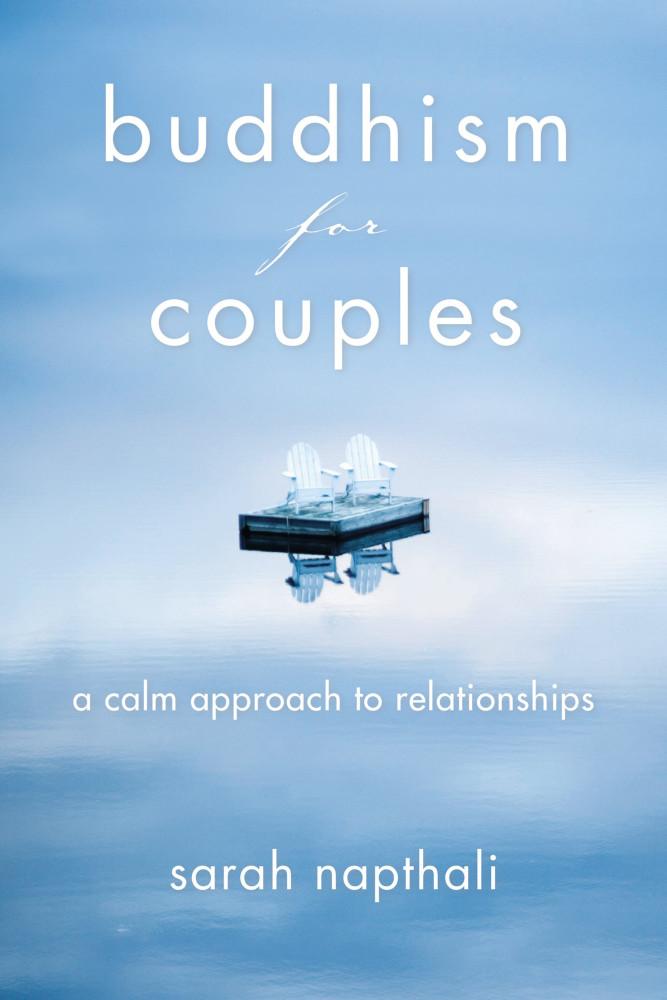By Alison Bowen
Chicago Tribune.
Sarah Napthali is well-versed in the ways Buddhism can improve day-to-day living. After several books, including “Buddhism for Mothers” and “Buddhism for Parents on the Go,” the Australian author has trained her sights on relationships. She has been with her spouse for more than 20 years and is the mother of two teenage boys, so she has much to say about weaving spirituality into the day-to-day challenges of a romantic partnership.
In “Buddhism for Couples” (Tarcher), published in June, the Sydney resident promises “a calm approach to relationships.” With chapters on topics as diverse as sex, housework and battling negativity, Napthali brings in Buddhist principles that couples, spiritual or not, can implement. We talked to her about bringing the Buddha into small tasks (or annoyances), as well as life-changing decisions. Following is an edited transcript of our conversation.
Q: You’ve said your husband is “chronically uninterested” in Buddhism. Can one person implement Buddhist teachings in a helpful way for both people?
A: Even if just one person tries to apply the teaching, it can have an effect on the other person. That always makes people think, “But hang on, if I become much more kind and generous and understanding, does that mean that I’m going to be a doormat?” Thankfully, one of the big teachings of Buddhism is self-compassion and not leaving yourself behind. It’s about being quiet, assertive and making sure that you’re treated respectfully.
Q: How can the Buddhist concept of self-compassion help a couple? Isn’t that contradictory?
A: In lots of ways, if you can provide your own self-compassion, then you don’t feel cranky with your husband for not providing you (what you need). I think it makes you less needy if you can validate and accept yourself, rather than look to the outside world to do it for you. What better best friend to have than yourself?
Q: Is there one main principle people can take from Buddhism for relationships?
A: I would have said self-compassion. Second on the list would probably be mindfulness, and mindfulness in particular to your thoughts. So many of our thoughts are so mindless, and so many thoughts in relation to our relationship are very ruminative or grumbling. Mindfulness is not asking you to change those thoughts and suddenly become a positive thinker. It’s just (a reminder to) be aware of your thoughts. You might throw in the questions “Is this useful? Is this thought helpful?” The Buddha just taught (to) be aware of your thoughts. Awareness of the thoughts and the effects they’re having on your body, the effect they’re having on your mood, can make you change.
Q: You mention in the book that Buddhism can help with the daily things involved in a relationship, like housework.
A: We have a very automatic, habit-driven approach to resolving housework. It might be nagging; it might be sulking. All sorts of ways we’re probably not really proud of. One thing you can take from Buddhist teaching is to be aware of your habitual reaction to things that annoy you and perhaps to challenge that. Once you’re aware of that, you can try something new, try something creative, try a new way to solve this problem.
I often find myself, if there’s a festering problem, rather than having an argument or sulking, I have found writing a letter, very mindfully, has had fantastic results in my marriage. I probably write one a year. Unlike arguing, I find that the problem seems to get solved through that letter. You can edit it.
Q: What should you do if you’re upset with someone?
A: I think society’s telling you, if you feel bad, buy this product or lose weight. If you feel bad, there are always ways to resist feeling bad. But the Buddha was quite radical in saying, “Just be in the bad feeling. Just make some space for it. Don’t run away from it, don’t turn away from it, just be with it.” Remember that it won’t hang around for long; it never does. You don’t have anger that doesn’t change. It will change; it will pass. Just develop tolerance for your emotions. Develop curiosity and an ability to just be with them, and that on its own can take an edge off an emotion. Avoid coming at it with self-defeating kinds of crutches.
Q: What if neither partner considers herself or himself spiritual?
A: I actually think that (with) Buddhism, you can have a really unspiritual approach if you want. It’s a very, very practical practice. Mindfulness can be a great place to start, and also just trying to be compassionate.
One thing that’s really useful is not getting caught up in labels of your partner: “My partner’s greedy,” “My partner’s selfish” or even “My partner’s good”, just really simplistic labels and really fixed ways of seeing our partner. Buddhism encourages us to be curious and really acknowledge the complexity and the fact that, behind that, simplistic labels might (have) all kinds of causes and conditions. Never believe your own labels.














































































































































































































































































































































































